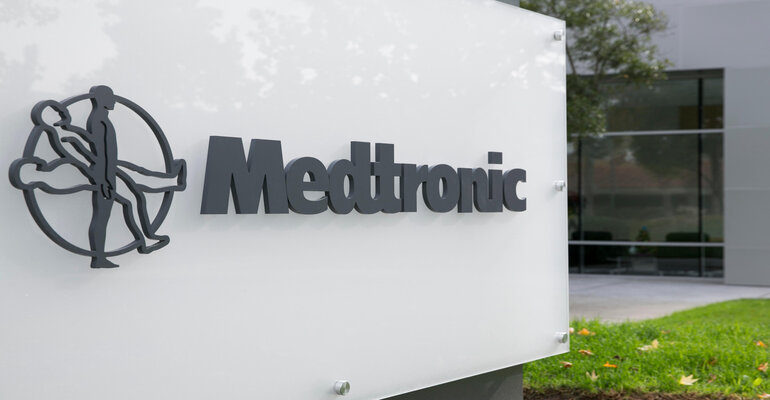Medtronic Renal Denervation Study Misses Primary Endpoint (Again)
Is it time to finally give up on renal denervation for hypertension?

Medtronic recently announced unsatisfactory six-month primary endpoint results from its Symplicity Spyral Renal Denervation (RDN) trial, becoming the second time the company has tried and failed to meet its primary endpoint of a change in blood pressure in patients after six months following its RDN procedure. The disappointing data was presented this week as late-breaking clinical science at the American Heart Association (AHA) Scientific Sessions 2022.
The global, randomized, sham-controlled study investigated the blood pressure lowering effect and safety of RDN in hypertensive patients who have been prescribed up to three anti-hypertensive medications, including diuretics, calcium channel blockers, ACE/ARB inhibitors or beta blockers. A total of 337 patients with uncontrolled hypertension were enrolled at 42 sites across the United States, Europe, Japan, Australia, and Canada, and were randomized 2:1 to RDN (n = 205) versus sham controlled (n = 132).
The primary Bayesian efficacy endpoint of 24-hour systolic ABPM reduction was not met, with a 51% probability of superiority for the RDN group versus sham. Researchers noted that factors including the COVID-19 pandemic, and an increase in outside medication could have contributed to the smaller than expected ABPM differences.
"Surprisingly, 24-hour ABPM declined with RDN but did not differ from the sham group, and the primary endpoint was not met,” said David Kandzari, MD, chief, Piedmont Heart Institute and Cardiovascular Services and SPYRAL HTN-ON MED lead principal investigator. “More than 80% of patients in the ON MED expansion group experienced follow up during the COVID-19 pandemic. Compared with patients enrolled before the pandemic, significant differences in baseline 24-hour ABPM were observed that may reflect changes in patient behavior and lifestyle during the pandemic. Additionally, patients treated with the sham procedure increased the amount of medication they were taking compared to those treated with RDN. These factors likely contributed to the smaller than expected differences in ABPM."
Much like its 2014 predecessor, the 2022 study met its primary safety endpoints. The trial demonstrated low incidence of procedure-related and clinical adverse at six-months, the Win Ratio saw significance in favor of RDN versus sham (p = 0.005), and overall burden of medications was higher in the sham group at six months (p = 0.04).
The trial also reported that the RDN system had a statistically significant and clinical meaningful reduction in office-based systolic blood pressure, which was a key secondary study endpoint. "The ON MED study demonstrated significant reductions in office-based blood pressure, the most commonly used measure in clinical practice," Kandzari said. “Additionally, we saw reductions in absolute blood pressure that were consistent with earlier RDN studies.”
Despite not meeting the primary endpoint, Medtronic has submitted the final module for the Symplicity Spyral Premarket Approval package to the FDA for review and approval. "The ON MED results presented today serve as an additional piece of our extensive compendium of safety and efficacy evidence on this procedure,” said Jason Weidman, senior vice president and president of the Coronary and Renal Denervation business, which is part of the Cardiovascular Portfolio at Medtronic. “With these results in hand, we submitted our PMA package to the FDA, which includes the totality of available evidence from the SPYRAL HTN clinical program.”
So, are we on the edge of another mass exodus in renal denervation for hypertension? It was after Medtronic’s initial study disappointment in 2014 that multiple other companies decided to jump ship on their investigations in the space, including Covidien (pre-Medtronic merger), Boston Scientific, and St Jude Medical (pre-Abbott Laboratories merger). While it remains to be seen, Medtronic (NYSE:MDT) did see a stock hit following the trial result announcement, declining 4% in Tuesday’s early trade.
For now, according to BTIG analysts, Ryan Zimmerman and Sam Durno, they are satisfied with the company’s explanation to medication changes favoring BP reductions and success of Medtronic’s overall abundance of data it has built around its RDN program. However, they are less convinced there is a clear pathway to commercialization and subsequent reimbursement the FDA and payers may grant for RDN treatment.
“We left the investor update with a clear view as to why the trial failed statistical significance in ABPM but still have questions regarding how RDN comes to market and how fast it can ramp sales,” Zimmerman and Durno wrote.
About the Author(s)
You May Also Like



.png?width=300&auto=webp&quality=80&disable=upscale)
